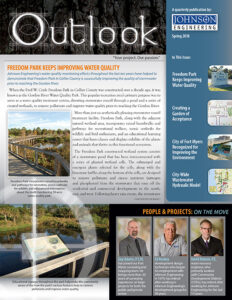 When the Fred W. Coyle Freedom Park in Collier County was constructed over a decade ago, it was known as the Gordon River Water Quality Park. This popular recreation area’s primary purpose was to serve as a water quality treatment system, diverting stormwater runoff through a pond and a series of created wetlands, to remove pollutants and improve water quality prior to reaching the Gordon River.
When the Fred W. Coyle Freedom Park in Collier County was constructed over a decade ago, it was known as the Gordon River Water Quality Park. This popular recreation area’s primary purpose was to serve as a water quality treatment system, diverting stormwater runoff through a pond and a series of created wetlands, to remove pollutants and improve water quality prior to reaching the Gordon River.
More than just an aesthetically pleasing stormwater runoff treatment facility, Freedom Park, along with the adjacent natural wetland area, incorporates raised boardwalks and pathways for recreational walkers, scenic outlooks for wildlife and bird enthusiasts, and an educational learning center that hosts classes and displays exhibits of the plants and animals that thrive in this functional ecosystem.
The Freedom Park constructed wetland system consists of a stormwater pond that has been interconnected with a series of planted wetland cells. The submerged and emergent plants selected for the cells, along with the limestone baffles along the bottom of the cells, are designed to remove pollutants and excess nutrients (nitrogen and phosphorus) from the stormwater that runs off the residential and commercial developments to the north, east, and west. Following heavy rain events, the stormwater is pumped into the pond, where heavy particles settle out. This series of natural-looking pond areas, complete with lily pads and reptiles, acts as a filtration system for the stormwater before it discharges to a natural wetland area through a structure that mimics a bubbling brook. From there, the treated water sheetflows into the Gordon River, which has been deemed an impaired water body by Florida Department of Environmental Protection (FDEP) and now has a restriction on how much nitrogen it can receive. Prior to the construction of Freedom Park, the nutrient-rich stormwater used to flow directly into Gordon River and Naples Bay downstream, creating potential algal blooms and related water quality issues.
When the park was first constructed, Collier County asked Johnson Engineering to provide the environmental and water use monitoring services. Although the water quality monitoring required by the original permits consisted only of testing samples of water flowing out of the park, Collier County and Johnson Engineering saw the opportunity to monitor the pollutant removal efficiency of this beautifully constructed wetland system.
By collecting water quality samples from where water entered the park via a stormwater pump, in addition to the samples collected from the outfall structure where water flowed out of the park, our environmental scientists were able to demonstrate the effectiveness of the constructed wetlands as a water quality treatment system. We also began monitoring the volume of flow into and out of the park.
The inflow and outflow water quality monitoring and reporting that we have conducted at Freedom Park since 2008 have helped to demonstrate that this wetland treatment system successfully removes 48% of the total nitrogen and 80% of the total phosphorus from the stormwater inflow. In 2016, graduate students from Florida Gulf Coast University (FGCU) installed automated water quality samplers and other monitoring instruments at Freedom Park to further document the water quality benefits of this wetland system as part of a master’s thesis study. Johnson Engineering scientists collaborated with the students conducting the research by providing monthly flow data and access to annual water quality monitoring reports. Results from the first year of the two-year study corroborate removal of total nitrogen and total phosphorus throughout the rainy season and in conjunction with individual storm events.
In 2017, Collier County installed dataloggers outfitted with cellular communication at both pump stations that provide inflow to the water quality park. Johnson Engineering configured digital output from flowmeters at those stations to the dataloggers so that the flow data could be continuously recorded and accessed in real-time, along with outflow water level data already being recorded by FGCU. We also installed continuous recording water level sensors at both inflow pump stations. Collier County and FGCU hope this additional instrumentation will help further refine estimates of the park’s nutrient removal efficiency under various hydrological conditions.
This collaborative effort between Collier County, FGCU, and Johnson Engineering will continue to assess the effectiveness of the Freedom Park treatment system, which may help in the design of similar projects throughout southwest Florida, with the ultimate goal of improving the long-term health of Naples Bay and quality of life for local residents.
For more information, contact Tim Denison at 239.334.0046 or [email protected].
































































